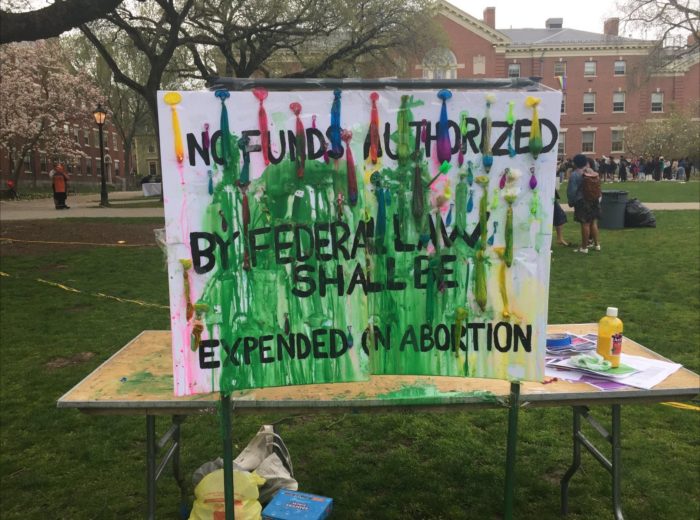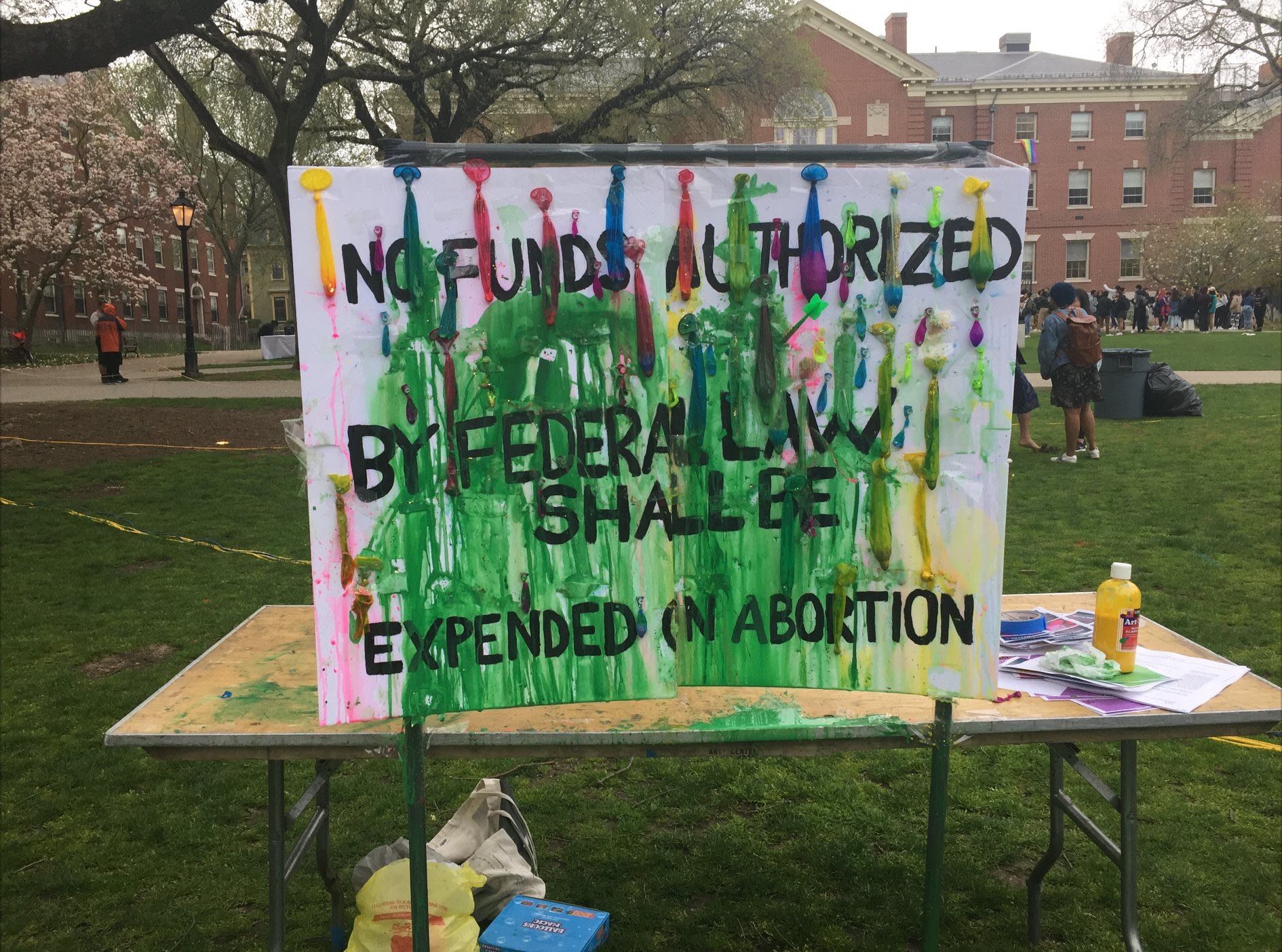“Did you know that we receive an F rating from NARAL Pro-Choice America, designating us as state with restricted access to abortion?” I asked, struggling to raise my voice above the steady hum of other students chatting with eager first-year students at my college’s annual activities fair.
Packed into my school’s gymnasium along with roughly 100 other student clubs and organizations, I stood behind a table covered with NARAL-embossed pens and buttons and several pamphlets detailing access to abortion and birth control, trying to attract the attention of the several hundred new first-years excited to get a taste of campus life beyond academics. I watched their facial expressions morph from surprise to displeasure to sheer confusion as I informed them that eighty percent of our state’s counties have no abortion clinic—that a state which Hillary Clinton overwhelmingly won in 2016 still prohibits abortion coverage for public employees and those enrolled in Medicaid. After all, I wasn’t describing my home state of Texas, but rather my newfound home of Rhode Island. How could our small, northeastern state receive the same rating as West Virginia, a state with only one remaining abortion clinic?

However, I recognized their expressions of confusion and disbelief. I remember walking up and down the seemingly unending rows of tables, overwhelmed by both the number of students and the different organizations ranging from cultural groups to politically-motivated clubs to community engagement organizations. As a prospective Gender Studies major with a passion for reproductive justice and choice, Brown’s chapter of NARAL immediately caught my eye. Having lived in Rhode Island not even two weeks I was certain that my newfound home, a vision of a tiny progressive haven, (that had just a week prior announced an initiative to pay all renewal fees for beneficiaries of the DACA program) surely couldn’t face the same challenges to abortion access as the likes of Texas or Wyoming. I must have mirrored the same expression of disbelief when the then-executive board members of the chapter informed me of Rhode Island’s anti-choice policies; policies that I found myself repeating, a year later, to a sea of new first-year students.
Despite our left-leaning state government, Rhode Island ranks as a state hostile to reproductive rights due to a strong Catholic presence and a staunch “pro-life” movement, leaving us with outdated and anti-choice laws (currently unenforceable due to Roe v. Wade). As an outlier in the progressive Northeast, Rhode Island has a state law describing human life as beginning “at the instant of conception.”
In light of Kavanaugh’s appointment to the Supreme Court last year and nationwide attacks on abortion, not only is Roe v. Wade under threat, but abortion access is also being severely curtailed even in “blue” states like Rhode Island. The Reproductive Health Care Act (RHCA) has been introduced for the past three years to codify Roe into state law and repeal the antiquated abortion restrictions still on the books. This past year, the Reproductive Privacy Act (RPA) was also introduced as a more “moderate” bill that sought to codify Roe without repealing Rhode Island’s anti-choice abortion laws. Ultimately, the Reproductive Privacy Act was amended to eliminate the unconstitutional addenda of spousal notification and the decree that life begins at conception.
Yet even codifying what was the status quo guaranteed by Roe proved to be extremely controversial. As my peers and I walked to the state house to advocate for the Reproductive Privacy Act, we were met with swarms of anti-abortion protesters (and their young children) carrying signs depicting graphic pictures of fetuses and overwhelming the small crowd of Planned Parenthood volunteers in pink shirts. After hours spent at hearings to demonstrate our vocal support, phone banking, and writing letters to legislators, I felt completely and utterly exhausted. Even worse, I felt horribly cynical. After two consecutive years of this legislation’s introduction (and subsequent failure), realistically, what was the chance that it would finally pass this year? I shared a similar sentiment as President of Brown’s NARAL chapter, Maeve Wiesen, who “was almost totally convinced that the legislation was going to die, [which made] it … really hard to motivate [her]self to do any work to help it pass once [she] was in that mindset.”

It didn’t seem to matter than seventy-one percent of Rhode Islanders consistently supported a bill to protect abortion access. It didn’t seem to matter that the 2019 conversation surrounding the RPA mimicked a 1993 conversation on virtually the same bill. It was frustrating that the bodily autonomy of thousands of people remained in the hands of a few powerful legislators who believe that access to basic reproductive care isn’t “a real concern”—legislators who believe that it’s more important to keep the PawSox baseball team in Rhode Island than it is to protect access to healthcare. And it was disheartening, because an anonymous email read by Senator Susan Sosnowski pointed out that an overturn of Roe v. Wade coupled with the failure to pass the RPA would affect not the “women of means, and mostly whiteness [who] will always be able to terminate a pregnancy if they feel it is necessary” but rather “women in poverty, young … women, women of color, [and] women who are aware they are unable to care for the children they already have.”
And yet—in spite of all of this, Rhode Island ended up passing the RPA at the last minute due to, according to Wiesen, “all the work that local organizers did who never for a second gave up.”
Being a “blue” state is clearly not enough when anti-choice Democrats—who compose a large portion of the Rhode Island state legislature—are unwilling to stand up for reproductive rights. While the RPA certainly illustrates a victory for the pro-choice movement, we cannot allow ourselves to remain complacent because there is still much work to be done. As Governor Gina Raimondo signed the bill into law, she remarked that “the bill preserves the status quo.” Preserving the status quo does nothing to change the fact that Rhode Island still has only three clinics providing abortion, two of which are located in Providence, rendering them inaccessible for the vast majority of the state; Rhode Island still requires parental consent for minors and refuses to cover abortion insurance for public employees; and Rhode Island still prohibits the use of Medicaid funds for abortions, effectively barring low-income patients from accessing quality and compassionate healthcare given that the average cost of an abortion starts at $500 and only increases as pregnancy progresses, and disproportionately impacting people of color and LBGTQ+ communities.
As SisterSong’s tenets of Reproductive Justice state: “There is no choice when there is no access.” We are not done. And we will keep fighting for reproductive autonomy and equitable access to reproductive care for all people.

